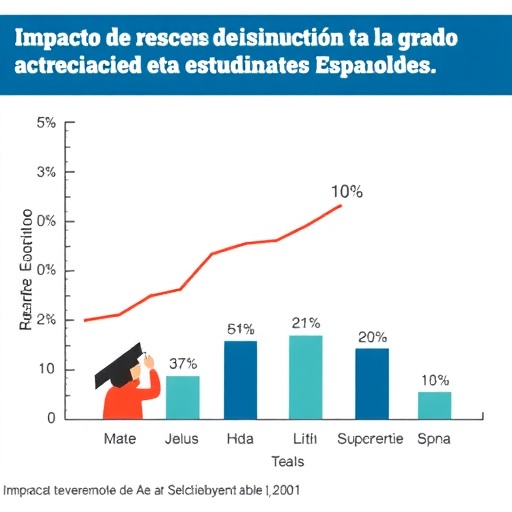The education system often grapples with the dilemma of student retention versus progression. A recent study by León and Martínez-Abad in the journal Large-scale Assess Educ examines this crucial issue, focusing specifically on Spanish students. Their research employs a sophisticated statistical technique known as propensity score matching, aiming to assess the impact of grade retention on academic performance.
Grade retention, the practice of requiring a student to repeat a specific grade level, has long been a topic of heated debate among educators and policymakers. Proponents argue that it provides students an additional opportunity to master content and skills they may have struggled with, while critics contend that it can have detrimental effects on a child’s self-esteem and motivation. The findings of León and Martínez-Abad add significant empirical evidence to this ongoing discourse.
Through their analysis, the researchers utilized a robust dataset, carefully controlling for variables such as socioeconomic background, prior academic achievement, and individual student characteristics. This methodological rigor allows them to draw more reliable conclusions about the repercussions of grade retention. By comparing retained and non-retained students who share similar characteristics, the researchers provide insights that are more reflective of the actual impact of retention practices, rather than the noise that often clouds educational research.
The results reveal nuanced effects of grade retention. In certain cases, retained students demonstrated improved performance in subsequent academic years. However, this improvement is contingent on various factors, including the age at which retention occurs and the support systems available to students during their repeated academic year. The implication here is clear: simply holding a student back does not guarantee better outcomes; the context in which this decision is made is crucial.
Tapping into the implications of these findings, educators and school administrators must reconsider their approaches toward grade retention policies. Schools should focus on developing comprehensive intervention strategies that not only address the academic needs of struggling students but also support their emotional and psychological well-being. This could involve supplemental tutoring, mentoring programs, and fostering an inclusive classroom environment that celebrates diverse learning paths.
Moreover, the study encourages a dialogue among stakeholders regarding the criteria for grade retention. Should retention be based solely on academic performance, or should other factors, such as emotional maturity and social skills, also be taken into account? León and Martínez-Abad’s research indicates that a more holistic view could better serve the needs of students, allowing for tailored solutions that recognize individual differences.
The discussion surrounding retention also intersects with broader educational trends, including the push for personalized learning approaches and the growing recognition of the importance of social-emotional learning in educational outcomes. As schools adopt more individualized educational practices, understanding the role of retention within this framework becomes increasingly relevant.
Furthermore, as educational systems worldwide examine their policies and practices, findings such as those presented in this study play a vital role in shaping evidence-based interventions. Schools cannot afford to operate on anecdotal evidence; rather, they must ground their decisions in empirical research that elucidates the real effects of their policies.
In addition to the immediate implications for educators and policymakers, this research contributes to a growing body of literature that scrutinizes how educational decisions impact student outcomes. For researchers, it sets a precedent for exploring additional variables and outcomes associated with grade retention—such as future academic success, dropout rates, and career trajectories.
Thus, León and Martínez-Abad’s contribution goes beyond just the Spanish education system. Their findings have the potential to resonate globally, affecting how similar issues are tackled in different educational contexts. As the world becomes increasingly interconnected through education, sharing insights and learnings can foster a collective push toward improving student experiences and success.
In conclusion, the study urges a reevaluation of how grade retention is understood and implemented in schools. By focusing on the factors that affect a student’s ability to thrive, educators can make more informed decisions that align with the ultimate goal of fostering a supportive and effective learning environment. As the educational landscape continually evolves, research such as this will be vital in guiding reforms and ensuring that the needs of all students are met.
In sum, the ongoing debate surrounding grade retention requires not just theoretical discussion but also practical, evidence-based approaches that incorporate the complexities of student experiences. León and Martínez-Abad’s research serves as a crucial resource in this dialogue, reminding all educational stakeholders of their commitments to foster environments where every student can excel—regardless of their educational journey.
Subject of Research: The impact of grade retention on academic performance in Spanish students.
Article Title: The effect of grade retention on performance in Spanish students: a propensity score matching approach.
Article References: León, J., Martínez-Abad, F. The effect of grade retention on performance in Spanish students: a propensity score matching approach. Large-scale Assess Educ 13, 8 (2025). https://doi.org/10.1186/s40536-025-00243-0
Image Credits: AI Generated
DOI: https://doi.org/10.1186/s40536-025-00243-0
Keywords: Grade retention, academic performance, propensity score matching, education policy, Spain.




